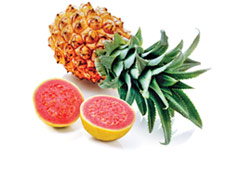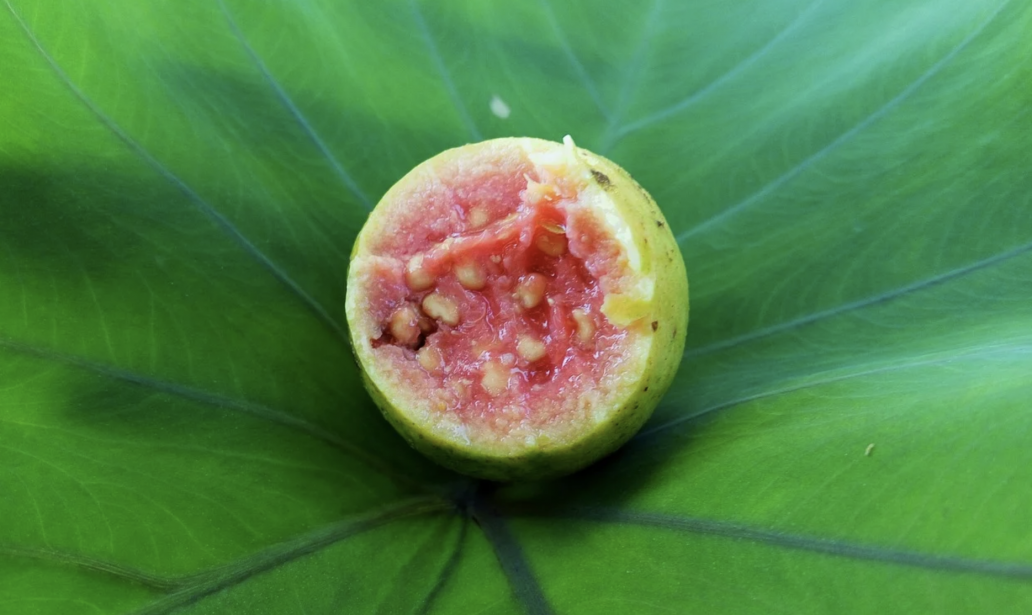Used in Trinidad and Tobago for everything from jams and cheese to juices and fruit salads, guavas are thought to be native to southern Central America and Mexico. Soft, sweet, and fragrant when ripe, guavas are small and round or oval, with varying colors from yellow to pink to dark red, depending on the variety.
Guava Nutrition Facts
Serving Size: One cup of guava chunks (165 grams)
Amt per serving:
Calories: 112
Carbohydrates: 24 mg
Sugar: 15 g
Fibre: 9 g
Protein: 4 g
Health Benefits
Guava contains nutrients that help curb all kinds of illnesses, including cancer and diabetes. Its vitamin A content is five times that of an orange, and it also has stellar amounts of protein, fibre, and folate, and possibly more vitamin C than any other fruit. Antioxidants and flavonoids also are in abundance in guavas.
Compared to the same amount of pineapple, guavas contain 30 more calories per serving, but three times the protein and more than four times the fibre. All that fibre makes guavas a great ‘regulator’, while helping to protect the colon by reducing the risk of cancer-causing toxins and chemical build up.

While pineapples provide 131% of the daily value of vitamin C in a serving, guavas offer 628%. Guava should be eaten with the skin, like an apple, imparting even higher concentrations of vitamin C. Eating fruits rich in this vitamin helps the body build up resistance to infection, including infectious diseases, while scavenging free radicals that could cause serious illnesses.
Guavas contain: vitamin A (21% of the daily value), essential for maintaining healthy mucus membranes and skin; folate (20%), great for pregnant women to help prevent neural tube defects. Flavonoids include beta-carotene (a known cancer inhibitor); lycopene, which in pink guava has been found to protect the skin against UV rays and help prevent prostate cancer; lutein and cryptoxanthin, both antioxidants. Guavas have potassium, too – more per serving than even a banana – which is important as heart rate and blood pressure regulators.
However, consume guavas in moderation because they contain fructose, which may be harmful to your health in excessive amounts.
Studies on Guava
Guava showed a marked blood glucose lowering effect when eaten by both adults at risk for diabetes and healthy volunteers, indicating its possible usefulness in improving and/or preventing diabetes mellitus, or adult-onset diabetes.
Guava leaf tea (GLT), which contains the polyphenols quercetin and ellagic acid, and regulates the absorption of dietary carbohydrate from the intestines, is given to patients at high risk of developing diabetes to curb blood sugar spikes after meals.
Guava Healthy Recipes: Spicy Guava Salad
Ingredients:
- 2 to 4 medium-sized guavas
- Half teaspoon roasted cumin powder
- Half teaspoon red chili powder
- A pinch of Chaat masala
- A few sprigs of cilantro or coriander leaves, finely chopped
- Lemon juice to tast
- Salt to taste
Procedure:
- Chop the guavas finely or into bite-sized pieces, depending on how you want it. Ensure that guavas are not too ripe or too raw.
- Transfer the chopped guavas into a bowl.
- Add the chaat masala, red chili powder, cumin powder, and salt.
- Add finely chopped coriander leaves.
- Squeeze lemon juice over it and give it all a good toss till everything is mixed well.
- Serve immediately.

